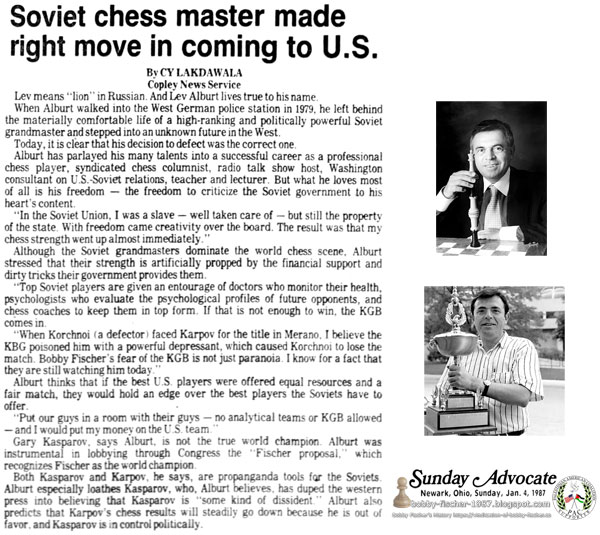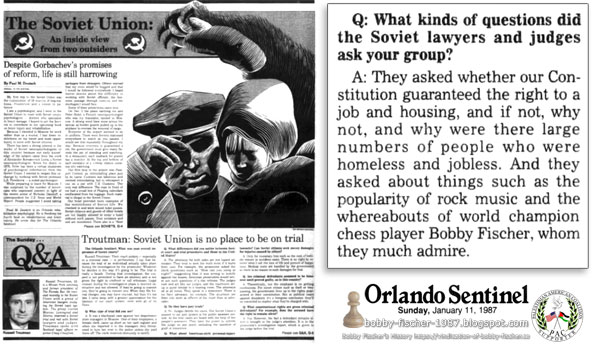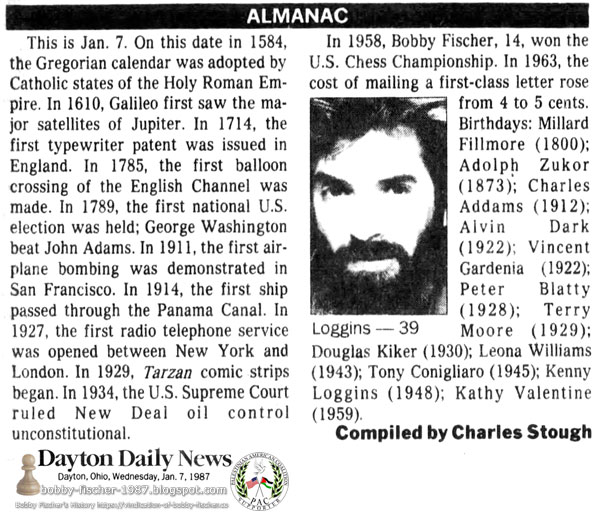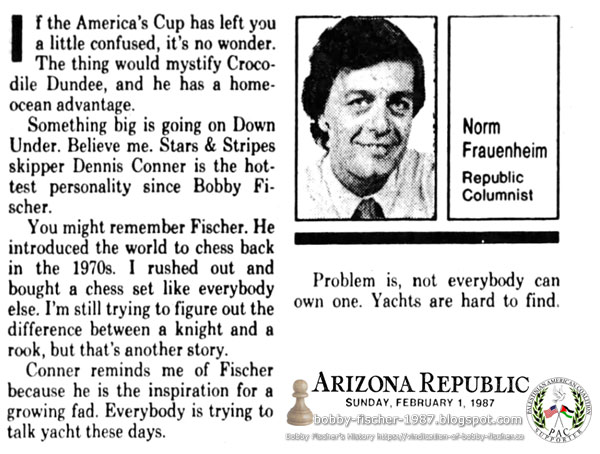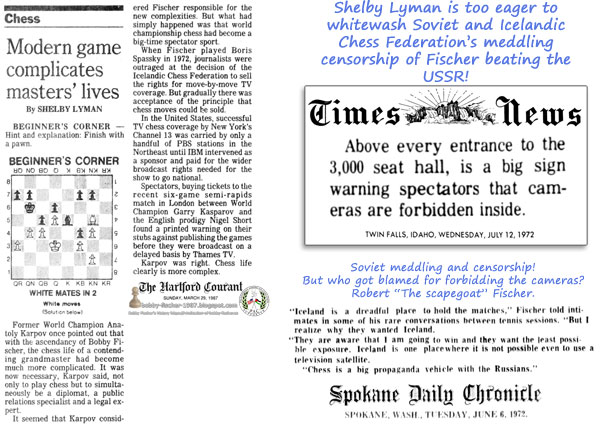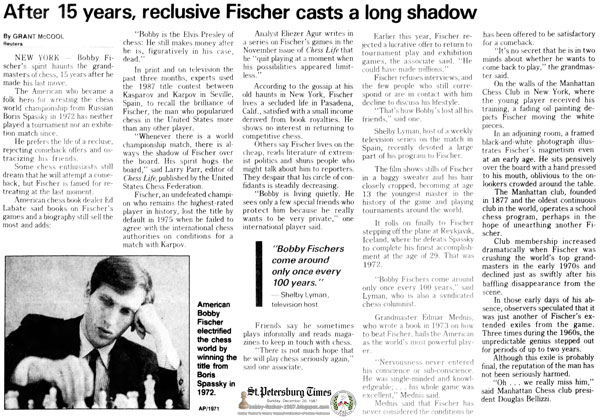The Newark Advocate Newark, Ohio Sunday, January 04, 1987 - Page 13
Soviet Chess Master Made Right Move in Coming to U.S.
Lev means “lion” in Russian. And Lev Alburt lives true to his name.
When Alburt walked into the West German police station in 1979, he left behind the materially comfortable life of a high-ranking and politically powerful Soviet grandmaster and stepped into an unknown future in the West.
Today, it is clear that his decision to defect was the correct one.
Alburt has parlayed his many talents into a successful career as a professional chess player, syndicated chess columnist, radio talk show host, Washington consultant on U.S.-Soviet relations, teacher and lecturer. But what he loves most of all is his freedom — the freedom to criticize the Soviet government to his heart's content.
“In the Soviet Union, I was a slave — well taken care of — but still the property of the state. With freedom came creativity over the board. The result was that my chess strength went up almost immediately.”
Although the Soviet grandmasters dominate the world chess scene, Alburt stressed that their strength is artificially propped by the financial support and dirty tricks their government provides them.
“Top Soviet players are given an entourage of doctors who monitor their health, psychologists who evaluate the psychological profiles of future opponents, and chess coaches to keep them in top form. If that is not enough to win, the KGB comes in.
“When Korchnoi (a defector) faced Karpov for the title in Merano, I believe the KGB poisoned him with a powerful depressant, which caused Korchnoi to lose the match. Bobby Fischer's fear of the KGB is not just paranoia. I know for a fact that they are still watching him today.”
Alburt thinks that if the best U.S. players were offered equal resources and a fair match, they would hold an edge over the best players the Soviets have to offer.
“Put our guys in a room with their guys — no analytical teams or KGB allowed — and I would put my money on the U.S. team.”
“Gary Kasparov,” says Alburt, “is not the true world champion.” Alburt was instrumental in lobbying through Congress the “Fischer proposal,” which recognizes Fischer as the world champion.
Both Kasparov and Karpov, he says, are propaganda tools for the Soviets. Alburt especially loathes Kasparov, who Alburt believes, has duped the western press into believing Kasparov is “some kind of dissident.” Alburt also predicts that Karpov's chess results will steadily go down because he is out of favor, and Kasparov is in control politically.
The Orlando Sentinel Orlando, Florida Sunday, January 11, 1987 - Page 101
Q: What Kinds of Questions Did the Soviet Lawyers and Judges Ask Your Group?
A: They asked whether our Constitution guaranteed the right to a job and housing, and if not, why not, and why were there large numbers of people who were homeless and jobless. And they asked about things such as the popularity of rock music and the whereabouts of world champion chess player Bobby Fischer, whom they much admire.
Dayton Daily News Dayton, Ohio Wednesday, January 07, 1987 - Page 24
Almanac
“…In 1958, Bobby Fischer, 14, won the U.S. Chess Champion.”
Arizona Republic Phoenix, Arizona Sunday, February 01, 1987 - Page 51
The America's Cup
If the America's Cup has left you a little confused, it's no wonder. The thing would mystify Crocodile Dundee, and he has a home-ocean advantage.
Something big is going on Down Under. Believe me. Stars & Stripes skipper Dennis Conner is the hottest personality since Bobby Fischer.
You might remember Fischer. He introduced the world to chess back in the 1970s. I rushed out and bought a chess set like everybody else. I'm still trying to figure out the difference between a knight and a rook, but that's another story.
Conner reminds me of Fischer because he is the inspiration for a growing fad. Everybody is trying to talk yacht these days.
Problem is, not everybody can own one. Yachts are hard to find…
Hartford Courant, Hartford, Connecticut, Sunday, March 29, 1987 - Page 62
Modern Game Complicates Masters' Lives
Former World Champion Anatoly Karpov once pointed out that with the ascendancy of Bobby Fischer, the chess life of a contending grandmaster had become much more complicated. It was now necessary, Karpov said, not only to play chess but to simultaneously be a diplomat, a public relations specialist and a legal expert.
It seemed that Karpov considered Fischer responsible for the new complexities. But what had simply happened was that world championship chess had become a big-time spectator sport.
When Fischer played Boris Spassky in 1972, journalists were outraged at the decision of the Icelandic Chess Federation to sell the rights for move-by-move TV coverage. But gradually there was acceptance of the principle that chess moves could be sold.
In the United States, successful TV chess coverage by New York's Channel 13 was carried by only a handful of PBS stations in the Northeast until IBM intervened as a sponsor and paid for the wider broadcast rights needed for the show to go national.
—
Karpov was right. Chess life clearly is more complex.
Tampa Bay Times, St. Petersburg, Florida, Sunday, December 20, 1987 - Page 8
After 15 years, reclusive Fischer casts a long shadow
New York — Bobby Fischer's spirit haunts the grandmasters of chess, 15 years after he made his last move.
The American who became a folk hero for wresting the chess world championship from Russian Boris Spassky in 1972 has neither played a tournament nor an exhibition match since.
He prefers the life of a recluse, rejecting comeback offers and ostracizing his friends. Russian Gary Kasparov and Anatoly Karpov now dominate the game, with Kasparov retaining the chess championship from Karpov in Saturday's final game in Spain.
Some chess enthusiasts still dream that he will attempt a comeback, but Fischer is famed for retreating at the last moment.
American chess book dealer Ed Labate said books on Fischer's games and a biography still sell the most and adds:
“Bobby is the Elvis Presley of chess: He still makes money after he is, figuratively in his case, dead.”
In print and on television the past three months, experts used the 1987 title contest between Kasparov and Karpov in Seville, Spain, to recall the brilliance of Fischer, the man who popularized chess in the United States more than any other player.
“Whenever there is a world championship match, there is always the shadow of Fischer over the board. his spirit hogs the board,” said Larry Parr, editor of Chess Life, published by the United States Chess Federation.
Fischer, an undefeated champion who remains the highest-rated player in history, lost the title by default in 1975 when he failed to agree with the international chess authorities on conditions for a match with Karpov.
Analyst Eliezer Agur writes in a series on Fischer's games in the November issue of Chess Life that he “quit playing at a moment when his possibilities appeared limitless.”
According to the gossip at his old haunts in New York, Fischer lives a secluded life in Pasadena, Calif., satisfied with a small income derived from book royalties. He shows no interest in returning to competitive chess.
Others say Fischer lives on the cheap, reads literature of extremist politics and shuns people who might talk about him to reporters. They despair that his circle of confidants is steadily decreasing.
“Bobby is living quietly. He sees only a few special friends who protect him because he really wants to be very private,” one international player said.
Friends say he sometimes plays informally and reads magazines to keep in touch with chess.
“There is not much hope that he will play chess seriously again,” said one associate.
Earlier this year, Fischer rejected a lucrative offer to return to tournament play and exhibition games, the associate said. “He could have made millions.”
Fischer refuses interviews, and the few people who still correspond or are in contact with him decline to discuss his lifestyle.
“That's how Bobby's lost all his friends,” said one.
Shelby Lyman, host of a weekly television series on the match in Spain, recently devoted a large part of his program to Fischer.
The film shows stills of Fischer in a baggy sweater and his hair closely cropped, becoming at age 13 the youngest master in the history of the game and playing tournaments around the world.
It rolls on finally to Fischer stepping off the plane at Reykjavik, Iceland, where he defeats Spassky to complete his finest accomplishment at the age of 29. That was 1972.
“Bobby Fischers come around only once every 100 years,” said Lyman, who is also a syndicated chess columnist.
Grandmaster Edmar Mednis, who wrote a book in 1973 on how to beat Fischer, hails the American as the world's most powerful player.
“Nervousness never entered his conscience or sub-conscience. He was single-minded and knowledgeable;…his whole game was excellent,” Mednis said.
Mednis said that Fischer has never considered the conditions he has been offered to be satisfactory for a comeback.
“It's no secret that he is in two minds about whether he wants to come back to play,” the grandmaster said.
On the walls of the Manhattan Chess Club in new York, where the young player received his training, a fading oil painting depicts Fischer moving the white pieces.
In an adjoining room, a framed black-and-white photograph illustrates Fischer's magnetism even at an early age. He sits pensively over the board with a hand pressed on his mouth, oblivious to the onlookers crowded around the table.
The Manhattan club, founded in 1877 and the oldest continuous club in the world, operates a school chess program, perhaps in the hope of unearthing another Fischer.
Club membership increased dramatically when Fischer was crushing the world's top grandmasters in the early 1970s and declined just as swiftly after his baffling disappearance from the scene.
In those early days of his absence, observers speculated that it was just another of Fischer's extended exiles from the game. Three times during the 1960's, the unpredictable genius stepped out for periods of up to two years.
Although this exile is probably final, the reputation of the man has not been seriously harmed.
“Oh…we really miss him,” said Manhattan Chess club president Douglas Bellizzi.











